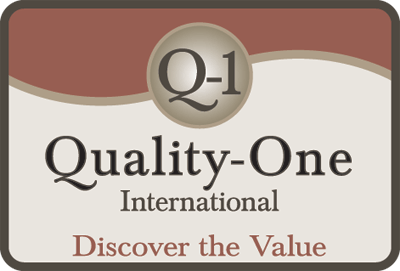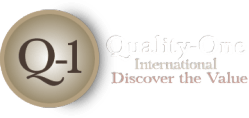APQP Training (Onsite)
– Training at Your Facility –
⇓ APQP Training Course Details
⇓ APQP Training Course Description
⇓ APQP Training Course Objectives

APQP Training Course Details (Onsite)
When you choose onsite Advanced Product Quality Planning (APQP) Training with Quality-One, our experts bring the knowledge of this methodology to your location. Many customers, especially those who have 5 or more participants that require training, have enjoyed the scheduling convenience of onsite training.
APQP Training Course Description (Onsite)
The Quality-One onsite APQP Training course is taught in an engaging instructor-led format. The instructor will describe the best practices that have made APQP such a successful methodology for improving product quality. Participants will learn the proper course of action for each phase of APQP and will be able to identify the correct inputs and outputs to make the process work as designed.
Participants will have the opportunity to interact with all elements of the APQP process, as well as learn about the other Quality and Reliability Tools that are built into the methodology’s framework. Team activities, workshops and other exercises will be used to reinforce the best practices of this methodology to ensure that each participant will be able to put APQP into action for their company’s unique production needs.
APQP Training Course Objectives (Onsite)
Participants can expect to learn and develop skills to confidently:
- Understand and use the 5 phases of APQP
- Know the difference between design goals, requirements and specifications
- Link tools to Product Development Process for more efficient use of engineering resources
- Create a Product Quality Plan for Program and Project Management
- Link outputs of key tools: Design / Process Failure Mode and Effects Analysis (DFMEA / PFMEA), Design for Manufacturability and Assembly (DFM/A)
- Define risk and determine levels of risk mitigation
- Select an effective Cross Functional Team (CFT) required for APQP
- Improve engineering collaboration
- Improve supply chain engagement with the organizations
- Implement ongoing continuous improvement in product development
- Determine design and process special characteristics
- Understand and demonstrate the links between Design FMEA and Process FMEA
- Create and manage action plans for design review
- Manage and store lessons learned for future use
- Setup a test plan based on requirements and risk
- Understand Control Plan Methodology
APQP Training Course Outline (Onsite)
Introduction to APQP
- 5 Phases of APQP
- Origin of APQP
- Relationship to PPAP
Phase 0: Inputs required for APQP
- Voice of the Customer (VOC)
- Market research
- Historical issues
- Team experience
- Business Plan and Marketing Plan
- Product and Process Benchmark
- Product and Process Assumptions
- Product Reliability Studies
- Customer Inputs (as applicable)
Phase 1: Plan and Define
- Tools and Techniques to Prepare for APQP
- Design Goals
- Reliability and Quality Goals
- Preliminary Bill of Material (BOM)
- Preliminary Process Flow
- Preliminary list of Special Characteristics
- Product Assurance Plan (workshop exercise)
- Gateway Approval
Phase 2: Product Design and Development Tools
- Design Failure Mode and Effects Analysis (DFMEA)
- Design for Manufacturing and Assembly (DFM/A)
- Design Verification
- Design Review
- Prototype Control Plan
- Engineering Drawings
- Engineering Specifications
- Material Specifications
- Change Control for Drawings
- New Equipment, Tooling and Facilities Requirements
- Special Product and Process Characteristics
- Gages / Testing Equipment Requirements
- Team Feasibility Commitment and Gateway Approval
Phase 3: Process Design and Development Tools
- Packaging Standards and Specifications
- Quality System Review
- Process Flow Chart
- Floor Plan Layout
- Characteristics Matrix
- Process Failure Mode and Effects Analysis (PFMEA)
- Pre-Launch Control Plan
- Process Instructions
- Measurement Systems Analysis (MSA) Plan
- Preliminary Process Capability Plan
- Gateway Approval
Phase 4: Product and Process Validation
- Significant Production Run
- Measurement Systems Analysis (MSA) Results
- Process Capability Studies
- Production Part Approval Process (PPAP)
- Production Validation Testing
- Packaging Evaluation
- Production Control Plan
- Quality Planning Sign-Off and Gateway Approval
Phase 5: Feedback Assessment and Continuous Improvement
- Reduced Variation
- Improved Customer Satisfaction
- Improved Delivery Performance
- Effective Use of Lessons Learned
APQP Training (Offsite)
– Training at Our Facility –
⇓ APQP Training Course Details
⇓ APQP Training Course Description
⇓ APQP Training Course Objectives

APQP Training Course Details (Offsite)
Offsite Advance Product Quality Planning (APQP) Training courses hosted by Quality-One provide participants a workshop environment where they can learn about this methodology without normal work interruptions. Courses at Quality-One Technical Training Centers feature an atmosphere in which participants from several different industries can share their experiences and the application of APQP in their specific situations. Such collaboration keeps interest high and result in new ideas about the application of APQP.
APQP Training Course Description (Offsite)
The Quality-One Offsite APQP Training course is set in an engaging instructor-led format. The instructor will describe the best practices that have made APQP such a successful methodology for improving product quality. Participants will learn the proper course of action for each phase of the APQP, and will be able to identify the correct inputs and outputs to make the process work as designed.
Participants will have the opportunity to interact with all elements of the APQP process, as well as learn about the other Quality and Reliability Tools that are built into the methodology’s framework. Team activities, workshops and other exercises will be used to reinforce the best practices of this methodology to ensure that each participant will be able to put APQP into action for their company’s unique production needs.
APQP Training Course Objectives (Offsite)
Participants can expect to learn and develop skills to confidently:
- Understand and use the 5 phases of APQP
- Know the difference between design goals, requirements and specifications
- Link tools to Product Development Process for more efficient use of engineering resources
- Create a Product Quality Plan for Program and Project Management
- Link outputs of key tools: Design / Process Failure Mode and Effects Analysis (DFMEA / PFMEA), Design for Manufacturability and Assembly (DFM/A)
- Define risk and determine levels of risk mitigation
- Select an effective Cross Functional Team (CFT) required for APQP
- Improve engineering collaboration
- Improve supply chain engagement with the organizations
- Implement ongoing continuous improvement in product development
- Determine design and process special characteristics
- Understand and demonstrate the links between Design FMEA and Process FMEA
- Create and manage action plans for design review
- Manage and store lessons learned for future use
- Setup a test plan based on requirements and risk
- Understand Control Plan Methodology
APQP Training Course Outline (Offsite)
Introduction to APQP
- 5 Phases of APQP
- Origin of APQP
- Relationship to PPAP
Phase 0: Inputs required for APQP
- Voice of the Customer (VOC)
- Market research
- Historical issues
- Team experience
- Business Plan and Marketing Plan
- Product and Process Benchmark
- Product and Process Assumptions
- Product Reliability Studies
- Customer Inputs (as applicable)
Phase 1: Plan and Define
- Tools and Techniques to Prepare for APQP
- Design Goals
- Reliability and Quality Goals
- Preliminary Bill of Material (BOM)
- Preliminary Process Flow
- Preliminary list of Special Characteristics
- Product Assurance Plan (workshop exercise)
- Gateway Approval
Phase 2: Product Design and Development Tools
- Design Failure Mode and Effects Analysis (DFMEA)
- Design for Manufacturing and Assembly (DFM/A)
- Design Verification
- Design Review
- Prototype Control Plan
- Engineering Drawings
- Engineering Specifications
- Material Specifications
- Change Control for Drawings
- New Equipment, Tooling and Facilities Requirements
- Special Product and Process Characteristics
- Gages / Testing Equipment Requirements
- Team Feasibility Commitment and Gateway Approval
Phase 3: Process Design and Development Tools
- Packaging Standards and Specifications
- Quality System Review
- Process Flow Chart
- Floor Plan Layout
- Characteristics Matrix
- Process Failure Mode and Effects Analysis (PFMEA)
- Pre-Launch Control Plan
- Process Instructions
- Measurement Systems Analysis (MSA) Plan
- Preliminary Process Capability Plan
- Gateway Approval
Phase 4: Product and Process Validation
- Significant Production Run
- MSA Results
- Process Capability Studies
- Production Part Approval Process (PPAP)
- Production Validation Testing
- Packaging Evaluation
- Production Control Plan
- Quality Planning Sign-Off and Gateway Approval
Phase 5: Feedback Assessment and Continuous Improvement
- Reduced Variation
- Improved Customer Satisfaction
- Improved Delivery Performance
- Effective Use of Lessons Learned
APQP Training (Online)
– Technical Training Overview –
⇓ APQP Training Course Details
⇓ APQP Training Course Description
⇓ APQP Training Course Objectives

APQP Training Course Details (Online)
The Quality-One online Advanced Product Quality Planning (APQP) Training course provides participants with a fully interactive overview of the basic principles of this methodology. The course includes audio, video, animation and downloadable reference materials accessible 24 hours a day. This online overview is an excellent tool for an introduction to APQP as well as for Subject Matter review.
APQP Training Course Description (Online)
Online APQP Training is self-paced, allowing participants the time necessary to familiarize themselves with the principles of the methodology. The participant will be able to understand each phase in APQP including all of the tools that are involved in making this framework effective. This overview is interactive, featuring videos, audio, illustrations, charts and other materials provided to help the participant put the basic principles of APQP into action.
APQP Training Course Objectives (Online)
Upon completion of this APQP Online overview, the participant will acquire the knowledge to:
- Explain what APQP is
- Describe the concepts required for developing a product assurance plan
- Explain how Cross Functional Teams (CFT) are used in APQP
- Define the phases of APQP
- Identify phase inputs and outputs
- Explain the value of Quality Planning
- Explain the move from Reactive to Prevention approach to product and process development
- Identify mitigation actions for reducing risks
- Explain the order or sequence of the tools of APQP
APQP Training Course Outline (Online)
Introduction to APQP
- 5 Phases of APQP
- Origin of APQP
- Relationship to PPAP
Phase 0: Inputs required for APQP
- Voice of the Customer (VOC)
- Historical issues
- Team experience
- Product and Process Benchmark
- Product and Process Assumptions
- Customer Inputs (as applicable)
Phase 1: Plan and Define
- Tools and Techniques to Prepare for APQP
- Design Goals
- Reliability and Quality Goals
- Preliminary Bill of Material (BOM)
- Preliminary Process Flow
- Preliminary list of Special Characteristics
- Product Assurance Plan (exercise workshop)
- Gateway Approval
Phase 2: Product Design and Development Tools
- Design Failure Mode and Effects Analysis (DFMEA)
- Design for Manufacturing and Assembly (DFM/A)
- Design Verification
- Prototype Control Plan
- Change Control for Drawings
- Special Product and Process Characteristics
- Gages/Testing Equipment Requirements
- Team Feasibility Commitment and Gateway Approval
Phase 3: Process Design and Development Tools
- Packaging Standards and Specifications
- Process Flow Chart
- Characteristics Matrix
- Process Failure Mode and Effects Analysis (PFMEA)
- Pre-Launch Control Plan
- Process Instructions
- Gateway Approval
Phase 4: Product and Process Validation
- Significant Production Run
- Measurement Systems Analysis (MSA) Results
- Process Capability Studies
- Production Part Approval Process (PPAP)
- Production Control Plan
- Quality Planning Sign-Off and Gateway Approval
Phase 5: Feedback Assessment and Continuous Improvement
- Reduced Variation
- Improved Customer Satisfaction
- Improved Delivery Performance
Learn More About APQP Training
Quality-One offers Quality and Reliability Support for Product and Process Development through Consulting, Training and Project Support. Quality-One provides Knowledge, Guidance and Direction in Quality and Reliability activities, tailored to your unique wants, needs and desires. Let us help you Discover the Value of APQP Consulting, APQP Training or APQP Project Support.
